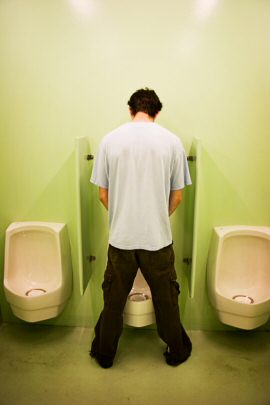Home Page
The latest articles, features and news.


Read About...


|
| | |
|
24 January 2011
Behavioral therapy after prostatectomy significantly reduces incontinence
by George Atkinson  For men with urinary incontinence following a radical prostatectomy, participation in a behavioral training program that included pelvic floor muscle training resulted in a significant improvement in bladder control. The study, in the Journal of the American Medical Association, also established that the addition of biofeedback and pelvic floor electrical stimulation provided no benefit.
For men with urinary incontinence following a radical prostatectomy, participation in a behavioral training program that included pelvic floor muscle training resulted in a significant improvement in bladder control. The study, in the Journal of the American Medical Association, also established that the addition of biofeedback and pelvic floor electrical stimulation provided no benefit. "Although survival [from prostate cancer] is excellent, urinary incontinence is a significant morbidity following radical prostatectomy, often the treatment of choice for localized prostate cancer. Patient surveys indicate that as many as 65 percent of men continue to experience incontinence up to 5 years after surgery," notes the study. "Although behavioral therapy has been shown to improve postoperative recovery of continence, there have been no controlled trials of behavioral therapy for post-prostatectomy incontinence persisting more than 1 year." After grouping by type and frequency of incontinence, the study participants were randomized to 1 of 3 groups: 8 weeks of behavioral therapy (pelvic floor muscle training and bladder control strategies); behavioral therapy plus in-office, dual-channel electromyograph biofeedback and daily home pelvic floor electrical stimulation (behavior plus); or delayed treatment, which served as the control group. Participants completed 7-day bladder diaries.
The researchers found that at 8 weeks, those in the behavioral therapy group had an average reduction of incontinence episodes of 55 percent (from 28 to 13 episodes per week), which was a significantly greater percent reduction than that reported by the control group (average reduction of 24 percent; from 25 to 21 episodes per week). Those in the behavior-plus group experienced an average reduction of 51 percent (from 26 to 12 episodes per week), indicating that the addition of biofeedback and electrical stimulation did not improve results compared with behavioral therapy alone. "Based on the significant decrease in incontinence frequency... these findings have important implications for urologists, primary care providers, and their patients," the researchers write. "Behavioral therapy should be offered to men with persistent post-prostatectomy incontinence because it can yield significant, durable improvement in incontinence and quality of life, even years after radical prostatectomy." Related:
Most Men "Emotionally Unprepared" For Prostate Removal
Sexual And Urinary Function Concerns After Prostate Treatment
New Prostate Cancer Tool Helps Patients Choose Treatments Source: Journal of the American Medical Association
|
|

